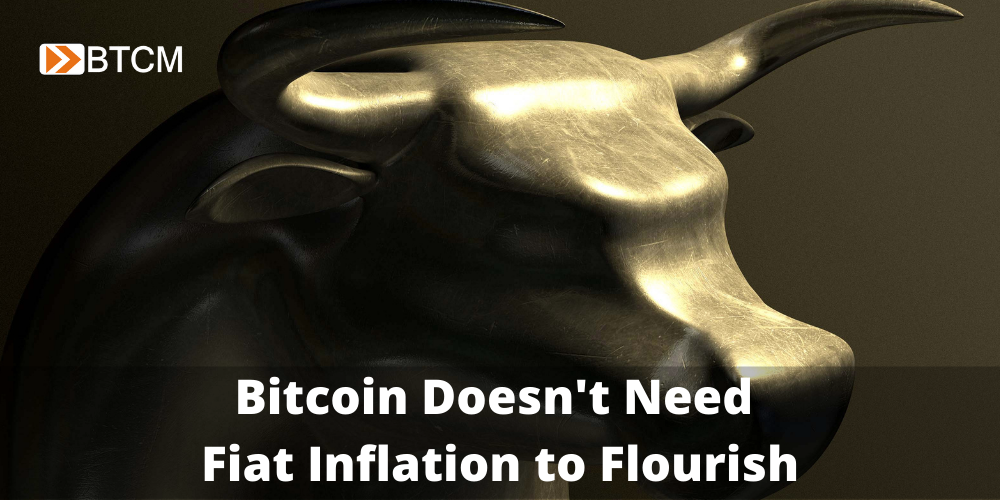Bitcoin Does Not Need Fiat Inflation to Flourish

The prevailing wisdom in the bitcoin space is that bitcoin's success is dependent on inflation of fiat currencies. Not surprisingly this is the same argument that has been advanced by gold bugs for decades as they predicted that ongoing inflation would lead to higher gold prices. Most bitcoiners say the flight to safety from fiat is the primary driver of bitcoin price appreciation.
The inflation argument sounds compelling but there's a problem... the fiat money supply isn't inflating. In fact, the global economy has been fighting deflation since 2008. One could say there was a slight reflation (a temporary expansion of output after a recession, a bounce not inflation), however, it is a far cry from a sustainable, natural economic recovery. With a pure credit-based money, economic expansion and inflation are the same thing.
To be clear, I also see asset prices going up, such as stocks and real estate, but asset prices are not inflation. Inflation is an increase in the money supply. There are many reasons prices can go up or down, especially in a financial system where we do not fully understand the financial plumbing. Changes in demand, changes to confidence, and changes to the state of collateral can all affect how the financial system operates but these do not necessarily affect the net supply of money in the system.
Why is this important? By identifying what is distorting the market we can determine what industries or lines of production are most distorted and make better economic calculation/investment decisions. If the supply of money was increasing that would that might lead us to invest in industries with high credit requirements and short bonds. However, if debt saturation and the corresponding deflation is what is distorting the market, we might want to be long bonds and short industries with high credit requirements.
Let's dive a little deeper to find out what's going on.
Fungibility
Confusion is caused by not understanding what money is, let alone assets which function like money, and for all intents and purposes these assets are money. The fungibility and liquidity of these near-money assets are extremely important to consider. (Fungibility means all units of the money are interchangeable. Liquidity means ease of conversion to other assets.) Any two one-dollar bills are interchangeable thus they are fungible, however, not all types of account balances denominated in dollars are interchangeable. In other words, you cannot buy a sandwich with every dollar on your balance sheet.
Two examples will help to demonstrate this point. First, we often hear that Jeff Bezos is the richest man in the world. However, most of his wealth is denominated in Amazon stock. Jeff Bezos does not have $100 billion to spend. He must convert his shares to dollars first. But if he began selling, his fortune would would shrink because selling a lot of shares by the founder and CEO would crash the price before he could access even a couple billion dollars worth. Or he could try to take out a loan collateralized by his shares, but a bank is not dumb and knows the shares are not very liquid. Therefore, his fortune is locked in stock for the most part and inaccessible in dollar terms.
A second example of non-fungible dollar assets is the typical home. The home is an asset denominated in dollars but we cannot spend those dollars without another step in the process. To get access to that money locked in our houses we must sell the home or take out a mortgage, a mortgage being a loan in which the home is used as collateral. The value of the house sits on your balance sheet, it can be made into a spendable form of money, but naturally is not spendable.
How does that apply to the inflation/deflation debate?
Central banks do not print money
The above examples are directly applicable to central banks and why they are not printing money. The go-to emergency monetary policy is Quantitative Easing (QE). QE consists of central banks buying assets from large banks in an attempt to bolster the banks' balance sheets. They claim to be increasing liquidity by buying assets and injecting cash into the system, but it is not cash they are using. Central banks create an asset on their balance sheet that has a fiat money value called "reserves," then they swap these reserves for other assets, typically government debt (Treasuries) held by the large banks.
The institutions' accounts at the Fed are credited with these reserves, but they are not cash because they cannot be spent like cash. These bank reserves are locked in the central bank and are, at best, a non-fungible form of money. In fact, when you see M2 rising by trillions of dollars, what you are actually witnessing is an increase in bank reserves, not dollars. It would be like putting a bunch of houses that don't really exist onto your balance sheet. Reserves are assets like a house, they aren't treated by the market as money, they are a balance sheet fiction.
QE is deflationary
Reserves, and hence QE itself, are an accounting gimmick used to replace real assets produced by market-based activity. The effects of QE are actually worse than simply not being able to print dollars or replacing market activity with a centrally planned fiction - QE is outright deflationary.
QE reduces the supply of money over time. Remember, QE is swapping a non-fungible asset (bank reserves) for US Treasuries (UST). What many do not appreciate is that those USTs are very useful on the open market to facilitate activities such as money movements, repo, and economic expansion through normal business processes.
USTs act as a dollar substitute in many cases, instantly convertible to cash in overnight repo arrangements. By removing USTs from circulation and replacing them with bank reserves, you are effectively removing liquidity and supply from the market. On the flip side, reserves provided through QE are inert, locked assets that are only useful as an accounting gimmick.
As more of the market is dominated by reserves held at the Fed than by USTs in the open market, the market becomes less dynamic and slows. Reserves are a symbolic replacement for purposeful free market activity. Therefore, QE from central banks restricts future downstream money creation by taking useful collateral out of the system. Even though it might balance the books on paper today, it results in less economic activity in the future and a net deflationary pressure on the economy.
Bitcoin is no one-trick pony
In the deflationary environment we just described bitcoin would be in trouble if it were dependent on inflation. Bitcoin is no one-trick pony that only benefits from inflation. That would mean bitcoin is weak and fiat money is in the driver's seat, when the exact opposite is true. The dollar based financial system is stagnant for the reasons described above and the Fed is helpless to stop it.
If bitcoin were dependent on inflation and the dollar strengthens, then what? Or what about bitcoin as priced in euros? If the dollar index is declining, as it has been recently, that means the euro is strengthening relative to the dollar, hence holders of the euro would have less incentive to buy bitcoin than dollar holders. We would also see people in countries where the currency is experiencing high inflation flooding into bitcoin, but we don't. Public interest in bitcoin is concentrated in countries with relatively stronger currencies.
Why bitcoin is succeeding
Bitcoin is gaining traction because of its many superior monetary properties. Its scarcity is the property that gets the most attention but all its other properties are equally as revolutionary. It is infinitely more transportable than gold and other monies. It is almost infinitely more divisible, more recognizable, and more fungible (with the exception of physical cash). Bitcoin is the best monetary good ever discovered.
Bitcoin's price goes up as more people want to hold it. People might want to hold it because they believe is it relatively undervalued, or because they believe bitcoin is less risky than other wealth storage assets such as corporate bonds or stocks. Contrary to the inflation dependence argument, an expectation of deflation (economic contraction) is also a big reason alternatives to bitcoin would be more risky.
Lastly, perhaps the biggest reason people hold bitcoin is that bitcoin brings optimism. Traditional investments are somewhat boring, and don't promise a new more sound economy like bitcoin. For example, one of the most popular visions of the future in the gold investment space is that of economic collapse into a Mad Max type of world. That is a fear based scenario for gold, rather than a hope based scenario of a brighter future with bitcoin.
Bitcoin does not need inflation in fiat currencies to win.




